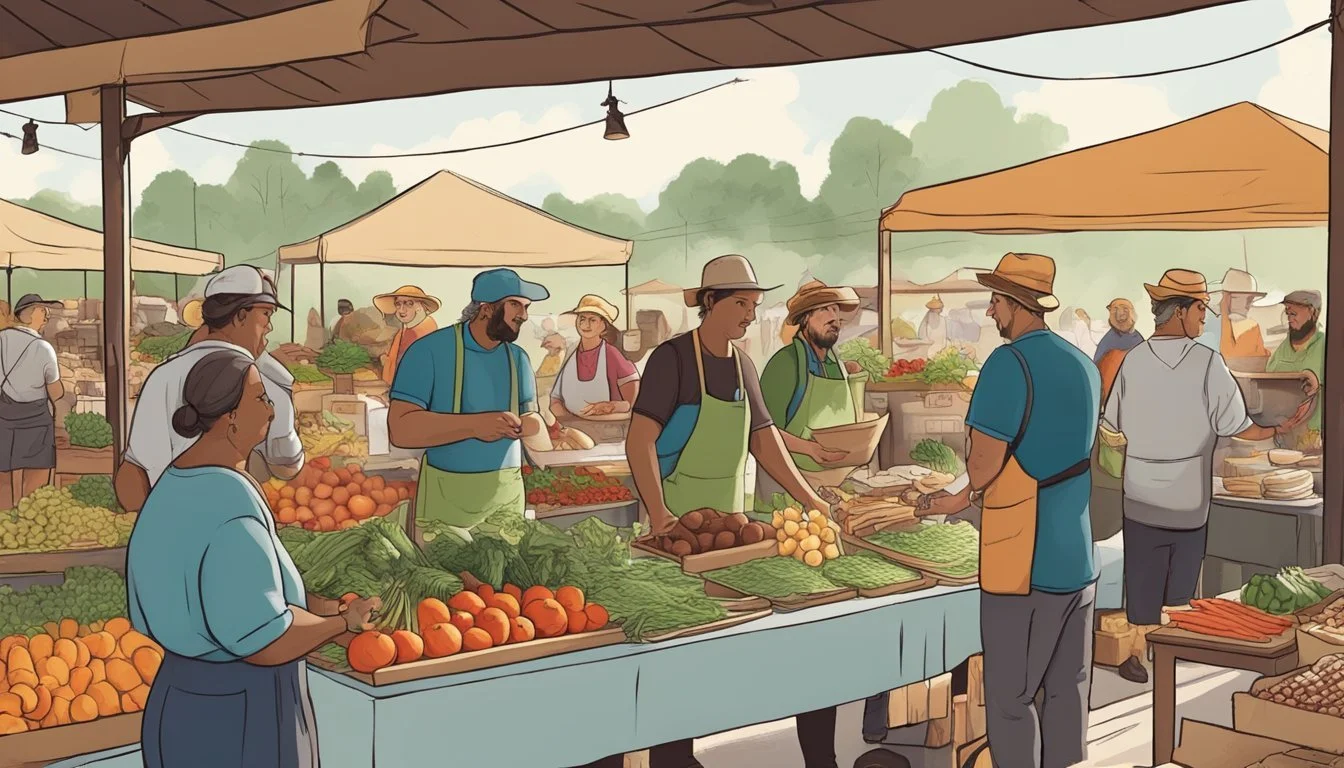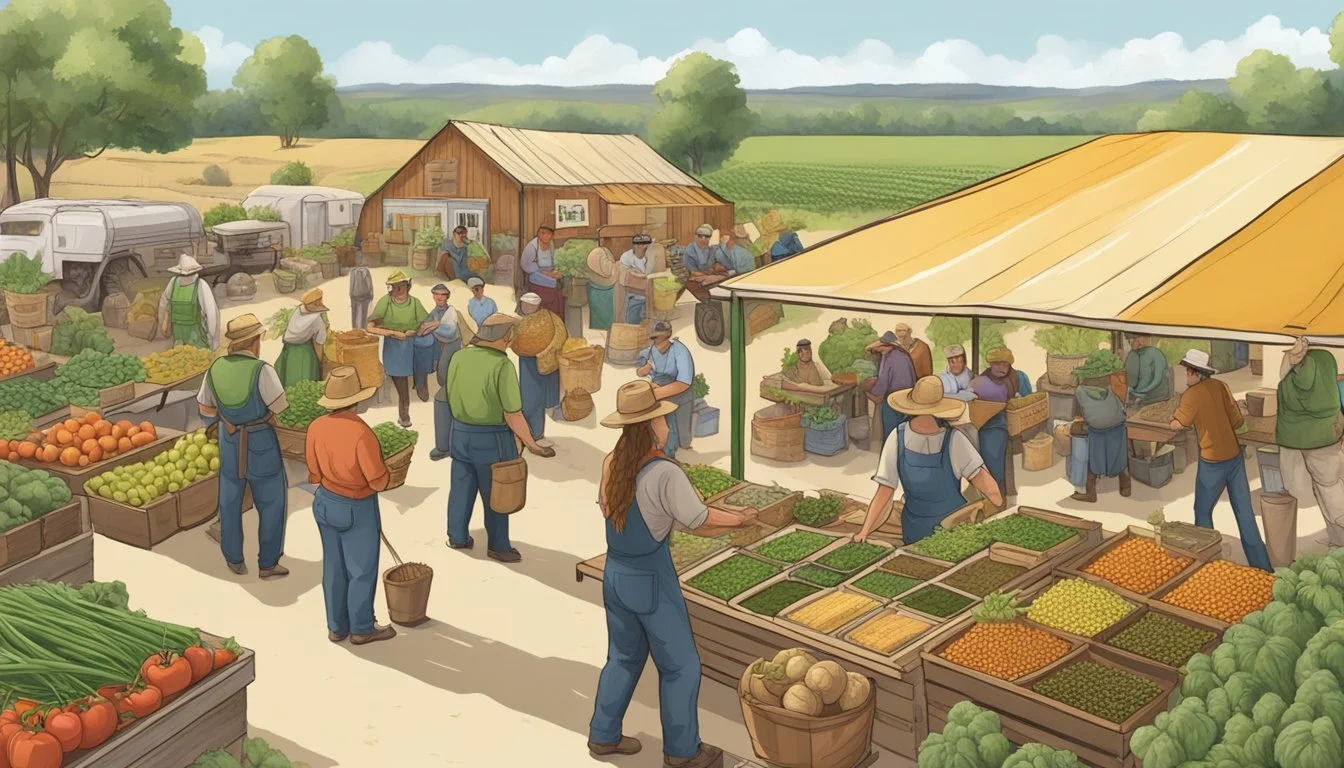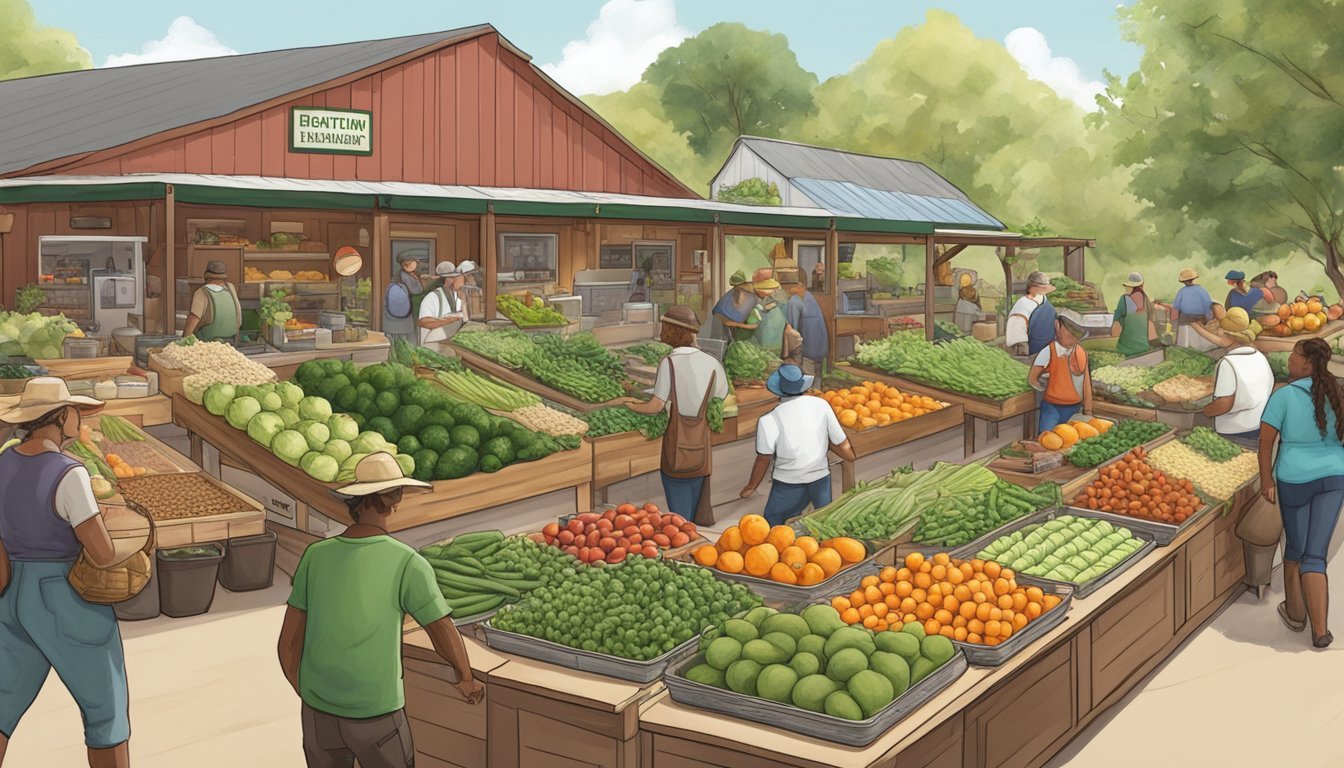The History of German Texan Food Cooperatives
Nurturing Community-Supported Agriculture
The intertwining of German heritage with Texan agriculture has yielded a unique flavor in the local food cooperatives and community-supported agriculture (CSA) initiatives. Tracing back to the 1800s, German settlers in Texas brought with them traditional farming practices and culinary customs, which have since evolved to adapt to the Texan climate and agricultural landscape. This melding of cultures has produced a distinct approach to farm cooperation and community involvement in food production—a perspective fostering both the conservation of German-Texan heritage and the development of sustainable farming practices.
Community-supported agriculture in Texas has seen a broader evolution as part of a nationwide movement towards sustainable food systems. Inspired by models from Europe, America saw the rise of its first CSA in the 1980s, and the model has grown in popularity ever since. In line with this wider trend, German Texan CSAs have encouraged direct partnerships between farmers and consumers, ensuring a market for locally grown products while maintaining the cultural linkages. These cooperatives provide a framework through which the communal aspects of German heritage can flourish, integrating traditional recipes with locally sourced ingredients to sustain both cultural identity and food quality.
Contributing to the growth of CSA in the region, an ethos of trust and transparency between consumers and producers mirrors Germany's own movement towards transparent food value chains. This trust has been essential in the face of broader challenges within the conventional agricultural system such as food scandals and ethical concerns. By embracing localized modes of food production, German Texan food cooperatives stand as testaments to the perseverance and adaptation of cultural practices through community-oriented agriculture.
Origins of German Texan Food Cooperatives
German immigrants began settling in Texas in the 1830s, bringing with them a rich tradition of agriculture and communal living. In Texas, they found a fertile land that was vastly different yet held great potential for the growth of their familiar crops and the raising of livestock. One way they maintained their heritage while adapting to their new environment was through the establishment of food cooperatives.
Cooperative Principles in German Communities
German settlers were known for their cooperative efforts in farming and sharing resources. This approach was rooted in their history of "Genossenschaft," a traditional German cooperative system, which they effectively adapted to the Texan agricultural landscape.
Collaboration: Settlers pooled resources to buy seeds and tools.
Shared Knowledge: They exchanged expertise on farming in Texan climate.
Common Good: Surplus was often distributed within the community.
The Impact on Agriculture
These cooperatives played a pivotal role in the development of Texan agriculture by fostering a close-knit community that emphasized sustainable farming practices and mutual support.
Crops: They cultivated both native Texan and imported German crops.
Livestock: German traditions in animal husbandry contributed to the diversification of Texan livestock farming.
Innovation: Cooperative efforts led to innovations in farming techniques well-suited to local conditions.
These foundations laid by the German Texan food cooperatives formed the cornerstone for what would eventually evolve into a broader movement of community-supported agriculture, which emphasized local production, direct marketing, and a strong community connection to the food system.
Introduction to Community-Supported Agriculture (CSA)
Community-Supported Agriculture represents a model of farming where the responsibilities and rewards of agriculture are shared. CSA relies on a close relationship between producers and consumers, characterized by mutual trust and the sharing of risks and benefits of food production.
Historical Development of CSA
The CSA model emerged from concerns about the sustainability of agriculture and the desire for a closer connection between people and the food they consume. The concept originated in Europe and Japan in the 1960s as a response to food safety concerns and the urbanization of agricultural land. In Japan, the Teikei system laid the groundwork for what would become known as community-supported agriculture.
Defining CSA Models
Community-supported agriculture (CSA) is characterized by consumers purchasing a share of the harvest from local farms in advance. This economic model provides farmers with upfront capital and reduces food waste by growing produce according to membership numbers. CSA models can vary, but the core idea consists of shared risk and reward, community engagement, and supporting local agriculture.
Global Spread and Adaptations
CSA has gained popularity globally as an alternative to traditional agriculture. It has been adapted to fit local contexts in numerous countries, including the United States, the United Kingdom, France, Germany (Solawi), Chile, and China, among others. These adaptations often reflect regional agricultural practices, cultural preferences, and social arrangements.
Teikei System in Japan
In Japan, the Teikei system is the precursor to the CSA model. "Teikei" translates to "partnership" or "cooperation," encapsulating the essence of the cooperative relationships formed. Participants share both the food produced and the risks of farming, emphasizing trust and reciprocal benefits.
Growth in North America
CSA began to take root in North America in the 1980s, with pioneers such as Robyn Van En and Jan Vander Tuin introducing the model. The first CSA farms in the region, Indian Line Farm in Massachusetts and Temple-Wilton Community Farm in New Hampshire, set a model for numerous others. Canada also contributes to the CSA movement, recognizing the value of community-based agriculture.
European Variations
Europe offers unique iterations of CSA, such as Solawi in Germany, which stands for solidarische landwirtschaft, or "solidary agriculture." This reflects a model firmly embedded in the values of food sovereignty and community. Similarly, France hosts an abundance of CSA-like initiatives tailored to foster a strong connection between consumers and their local producers while addressing growing concerns about greenhouse gas emissions from conventional agriculture.
The Role of Cooperatives in Agriculture
Agricultural cooperatives in a Texan German context have played a critical role in shaping local food systems, impacting production and distribution, and fostering community participation. These entities blend traditional German influences with Texan agricultural practices to support sustainability and governance in the sector.
Fundamentals of Agricultural Cooperatives
Agricultural cooperatives operate on the principle of collective effort where farmers pool resources to improve bargaining power and market reach. Fundamentally, cooperatives facilitate access to markets, reduce individual risk, and enhance product distribution efficiency. In the context of German Texan cooperatives, this translates to a more robust presence of local food, including organic vegetables, meat, and milk, in farmers' markets and local markets.
Texan German Cooperatives
Historically, German immigrants in Texas established cooperatives to maintain their cultural identity and bolster agricultural productivity. These cooperatives emphasized shared values of trust and social capital, enabling members to operate with a sense of community attachment. Texas's unique blend of German cooperative principles and local practices continues to influence governance and policy within the agricultural sector.
Impact on Local Food Systems
German Texan cooperatives greatly contribute to strengthening local food systems by promoting direct farmer-to-consumer interactions. They enhance the local food chain's integrity and encourage organic farming practices. By prioritizing the distribution of local food, these cooperatives help maintain the ecological farming aspirations of the broader environmental movement within Texas.
Cooperation and Community Building
Community engagement is the bedrock of cooperative success. Participatory governance models within these cooperatives foster a strong community land trust, preserving agricultural commons for future generations. German Texan cooperatives exemplify how together, individuals can leverage social capital to build resilient, supportive community networks.
Legal Framework and Governance
The legal framework governing cooperatives in Texas is designed to protect and encourage collaborative agricultural ventures. Policies regarding the formation and operation of cooperatives are geared toward ensuring trust among members, transparent governance structures, and the promotion of sustainable practices consistent with agroecological principles.
Sustainability and Environmental Considerations
Sustainability is central to the mission of German Texan food cooperatives. Through organic farming and ecological farming practices, these cooperatives embody the essence of the environmental movement. They play an instrumental role in pioneering sustainable food systems that respect the balance of nature, contributing to the health of both the community and the environment.
Economic Aspects of CSA and Food Cooperatives
The economic dynamics of community-supported agriculture (CSA) and food cooperatives are multifaceted, involving the interplay of innovative business models, financial strategies for growth, and policies shaping their economic viability. These elements collectively influence the economic sustainability of these systems and their impact on local markets.
CSA as a Business Model
The CSA model is a subscription-based system where consumers invest in a farm's production upfront, sharing both the risks and benefits of agricultural yield with the producers. This pre-payment allows farmers to plan resources more effectively and secure income at the start of the season.
Financial Stability and Growth
CSAs and food cooperatives contribute to financial stability by establishing predictable income streams for producers and consistent prices for consumers. Over time, successful CSAs demonstrate economic stability, growing from community-scale operations to influential drivers in local markets.
Microeconomic Effects
On a microeconomic scale, CSAs and food cooperatives aid in the deceleration of economic activities, promoting sustainability. By focusing on local resources and labor, these systems can have a redistributive effect on income, benefiting regional economies.
Marketing Strategies and Consumer Benefits
Marketing for CSA often relies on conveying the value of fresh, locally-produced goods to consumers. Benefits include more direct relationships with producers, often leading to improved product quality and trust in food distribution, as well as the awareness of supporting local agriculture.
Food Sovereignty and Self-Sufficiency
CSAs and food cooperatives embolden food sovereignty, allowing communities to assert control over their food systems. Localized food production and distribution, inherent in these models, encourage self-sufficiency and resilience against global market fluctuations.
Policy Impact on Economic Viability
Government policies can profoundly affect the economic viability of CSAs and food cooperatives. Tax incentives, grants, and regulations designed to support small-scale, sustainable agriculture can foster growth and sustainability within the sector, enhancing their economic impact on the community.
Cultural and Social Impact
German Texan food cooperatives and community-supported agriculture (CSA) have woven a rich tapestry of cultural and social influence by fostering communal values, preserving food heritage, and engaging local communities.
Community and Human Values
German Texan CSAs have reinforced the fabric of community by encouraging residents to partake in agricultural activities and share in the harvest. This collaborative effort reinforces trust and instills human values such as cooperation and mutual support.
Social Movements and CSA
The rise of CSAs in Texas echoes a global environmental movement, embodying a shift towards sustainable farming practices and heightened public participation in social movements advocating for food sovereignty and trust.
Short Food Supply Chains and Local Engagement
By prioritizing short food supply chains, these CSAs have enhanced local engagement. Members often "buy local," which not only supports agroecology but also builds relationships between growers and consumers, fostering a sense of community and trust.
Civic Agriculture and Public Involvement
Civic agriculture initiatives, like the Mahaiwe Harvest CSA, advocate for public involvement, transforming spectators into active participants in the food production process, thereby strengthening the public trust.
Transformation through Community Agriculture
Community agriculture fosters transformation by encouraging households to adopt sustainable practices. Engaging in CSA activities empowers community members to contribute to environmental stewardship and agriculture.
CSA and the Preservation of Traditional Foods
Preservation of traditional German Texan foods has been a hallmark of local CSAs. These cooperatives often include crops like topinambur (Jerusalem artichoke) and staples such as vegetables, meat, milk, and fruits, maintaining the area’s food identity.
Education and Public Awareness
Through CSA participation, individuals gain education about the importance of organic farming, food safety, and the historical context of their food. This public awareness fosters transparency and grows collective knowledge.
Solidarity and the Commons
The concept of Solidarische Landwirtschaft (solidarity agriculture) has its echoes in Texas, encouraging communities to form commons and community land trusts. This demonstrates a commitment to shared responsibility and stewardship of agricultural land.
Health Outcomes and Accessibility
Access to fresh, organic produce through CSAs has positively impacted health outcomes by making nutritious food more accessible. Communities benefit from the assurance of food safety and the ability to trust the source of their meals.
Cultural Heritage and Food Identity
German Texan CSAs have played an instrumental role in preserving the unique culinary heritage of the region. Through commitment to local food systems, they have safeguarded the German-Texan cultural heritage and food identity for future generations.
Challenges and Future Prospects
German Texan food cooperatives and community-supported agriculture (CSA) face numerous challenges, yet they also stand before a future filled with potential. The path ahead requires tackling distribution and marketing obstacles, responding to evolving consumer expectations, navigating regulatory policies, ensuring sustainability, harnessing technological innovations, and fostering deeper community bonds.
Overcoming Distribution and Marketing Hurdles
German Texan CSAs and food cooperatives often encounter distribution challenges such as establishing efficient food supply chains. Strategies include creating centralized drop-off points to streamline distribution and utilizing online platforms for broader market reach. Marketing, especially in a competitive local food market, demands a clear value proposition; emphasizing the benefits of fresh, locally-sourced, and organic products is key to attracting and retaining customers.
Adapting to Changing Consumer Demands
Adaptability is crucial, as consumer demands shift towards organic and ecologically farmed products. Cooperatives need to respond to these trends by offering diverse, culturally relevant food selections and flexible CSA share options, thereby maintaining consumer participation and supporting the local food system.
Regulatory Challenges and Policy Development
Navigating the complex landscape of regulation and policy is a constant struggle for food cooperatives. They must stay informed and compliant with food safety laws and equity policies while advocating for governance that supports small-scale producers. Policy development that encourages sustainable practices can help reinforce the stability of the food system.
The Sustainability of CSA and Cooperatives
Sustainability is both a goal and challenge. Embracing ecological farming practices helps in maintaining soil health and biodiversity. Implementing sustainable practices means not only ecological benefits but also long-term economic viability for the cooperatives and CSAs, providing a win-win for consumers and producers.
Technological Advancements in Food Cooperatives
Investing in technology can lead to innovation in the way food is grown, distributed, and marketed. Technology-driven solutions, such as precision farming tools and CSA management software, can improve efficiencies and food safety, ultimately benefiting both consumers and producers.
Building Stronger Community Relationships
Strong community relationships are fundamental to German Texan CSA's success. They enhance social capital and community attachment which are vital for sustained participation. Efforts to increase community involvement, such as hosting local events and educational programs, can deepen ties and bolster the food cooperative movement.
Conclusion
German Texan food cooperatives have become integral to the state's local food movement. They embody the essence of community-supported agriculture (CSA), prioritizing sustainability and fostering a direct relationship between producers and consumers. This model has historic roots, tracing back to early German settlers who valued self-sufficiency and community collaboration.
Today, these cooperatives champion the local food cause by connecting farmers and consumers. They operate on principles of mutual aid and democratic control, which are core to their identity and operations. These attributes reflect a broader CSA ethos that encourages ecological responsibility and communal well-being.
The evolution of German Texan food cooperatives demonstrates a blend of cultural heritage and modern ecological awareness. Their sustained relevance speaks to a successful adaptation in an ever-changing agricultural landscape.
Key Takeaways:
Cooperatives: A shining example of community and farmer collaboration for mutual benefit.
Sustainability: At the forefront of the mission, ensuring practices that care for the environment.
Local Food Systems: Reinforced by cooperatives, these systems support local economies and reduce environmental impact.
German Texan cooperatives and CSAs exemplify resilience and adaptation, preserving history while embracing contemporary values of sustainability and community.





